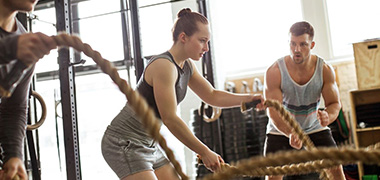
How do I become a sports coach?
Certificate II in Sport and Recreation
- There are no mandated entry requirements.






Diploma of Sport
- There are no mandated entry requirements.




Diploma of Sport (Coaching)
- There are no mandated entry requirements.



Diploma of Sport (Sport Development)
- There are no mandated entry requirements.


Bachelor of Education (Health and Physical Education)
- There are no mandated entry requirements.





Certificate II in Sport Coaching
- There are no mandated entry requirements.





Bachelor of Sport Development
- There are no mandated entry requirements.



Graduate Certificate of Strength and Conditioning
- There are no mandated entry requirements.


Certificate II in Sports Coaching
- There are no mandated entry requirements.
 Ipswich State High School
Ipswich State High School
Related occupations
Swimming Instructor
A Swimming Instructor teaches water safety, improves techniques, organises competitions, and tailors training to clients' needs, requiring strong communication skills.
Personal Trainer
Personal trainers conduct individual sessions to help clients meet fitness goals, creating tailored workout plans and ensuring safe program delivery.
Exercise Physiologist
An Exercise Physiologist designs physical activity programs for clients with diverse needs, assessing progress and adapting plans as required.
High Performance Coach
A High Performance Coach trains athletes and teams to enhance performance through motivation, fitness strategies, and recovery support while adapting coaching methods to individual needs.
Athlete
An Athlete competes in sports events, works with coaches, trains regularly, maintains fitness, and follows strategies to improve performance and teamwork.
Sports Scientist
Sports Scientists advise athletes and coaches on performance improvement, conducting assessments and developing tailored training and recovery plans.
Sports Psychologist
Sports Psychologists help athletes develop a winning mindset, manage competition pressures, and maintain motivation during recovery.
Sports Analyst
A Sports Analyst evaluates performance data and strategies, providing insights to improve team tactics and player conditioning for informed decision-making.
Athletic Director
An Athletic Director manages sports programmes and facilities in educational settings, ensuring efficient operations and promoting sportsmanship.
Performance Coach
A Performance Coach enhances professional skills by helping individuals or teams set goals, develop strengths, and achieve success through tailored strategies.
Common questions
How much does a Sports Coach earn?
In Australia, a full time Sports Coach generally earns $1,298 per week ($67,500 annual salary) before tax. This is a median figure for full-time employees and should be considered a guide only. As you gain more experience you can expect a potentially higher salary than people who are new to the industry.
What are the job opportunities for a Sports Coach?
The number of people working in this area has grown strongly in recent years. There are currently 59,700 people employed as a Sports Coach in Australia compared to 42,200 five years ago. Sports Coaches may find work across all regions of Australia.
Source: Australian Government Labour Market Insights
How do I become a Sports Coach?
If you’re interested in a career as a Sports Coach, consider enrolling in a Certificate IV in Sports Coaching. This course will allow you to train athletes to an advanced level and prepare them for sports competitions. You’ll also cover topics including sports technology, strength and conditioning programs and first aid. You could also consider a Certificate II or III in Sport and Recreation, a Diploma of Sport or a Diploma of Sport (Coaching).
Further reading


How to start a career in counselling
7th September 2020)

